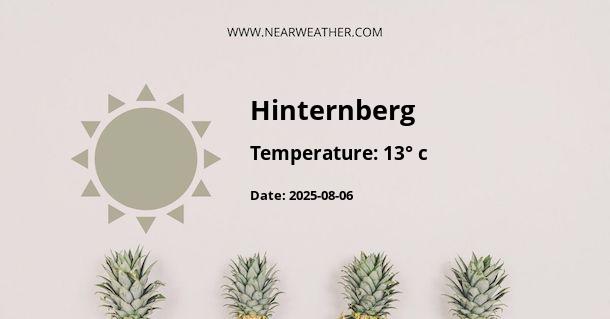Exploring the Climate and Weather of Hinternberg, DE
In the heart of Europe lies the quaint locale of Hinternberg, Germany. This charming town is characterized by a temperate oceanic climate, deeply influenced by both the Atlantic Ocean and continental weather patterns. Below, we delve into an in-depth exploration of Hinternberg's climate and weather, giving special attention to the seasonal variations and meteorological nuances that define this region year-round.
Annual Weather Overview
Hinternberg follows the typical four-season cycle inherent to many European towns. Given its latitude and elevation influences, residents and visitors can expect to experience a full range of temperatures and weather events throughout the year.
Temperature Patterns
- Winter: December to February bring cold temperatures, often dipping below freezing. Snow is a common occurrence, although its frequency and volume can vary annually.
- Spring: From March to May, the town witnesses a gradual warming with intermittent rain showers that usher in the blooming period.
- Summer: June to August are typically the warmest months, with temperature averages ranging from 18°C to 25°C (64°F to 77°F). Occasionally, heat waves can push these averages higher, particularly in late July.
- Autumn: September to November sees a noticeable cooling trend, coupled with an increased likelihood of foggy mornings and overcast days as the town prepares for winter.
Precipitation Trends
| Month | Average Precipitation (mm) | Average Precipitation (inches) |
|---|---|---|
| January | 60 | 2.36 |
| February | 45 | 1.77 |
| March | 50 | 1.97 |
| April | 58 | 2.28 |
| May | 72 | 2.83 |
| June | 80 | 3.15 |
| July | 78 | 3.07 |
| August | 75 | 2.95 |
| September | 65 | 2.56 |
| October | 70 | 2.76 |
| November | 65 | 2.56 |
| December | 68 | 2.68 |
Snowfall and Cold Weather Events
"Hinternberg's winters can oscillate between serene snowfalls that cloak the town in a quiet blanket of white and vigorous cold fronts that challenge even the hardiest of residents." – local meteorologist
Indeed, Hinternberg does not shy away from showcasing a rigorous winter season. Snowfall tends to be more pronounced in the elevated areas surrounding the town, where cold air masses interact with moisture-laden systems from the west.
Wind and Storm Patterns
Winds in Hinternberg typically follow a westerly path due to the prevalent influence of the Atlantic weather systems. However, cyclonic activity can disrupt this pattern, particularly in the transitional seasons of spring and autumn, which may lead to temporary but significant changes in wind direction and speed.
Monthly Climate Details
January – The Heart of Winter
The chilliest month of the year, January presents itself with frosty days and longer nights. Subzero temperatures are typical, especially during the night, and daylight averages a scarce 8 hours.
February – Slow Transition
While still cold, February marks the beginning of a subtle transition towards spring. Days start to lengthen slightly, and the onslaught of winter begins to weaken.
March – Spring Awakening
Spring peeks with milder temperatures and a mixture of rain and snow showers. The first blooms may be spotted towards the end of the month.
April – A Wetter Spring
Showers bring flowers, and April is no stranger to this notion. Increased precipitation supports the growth of lush greenery, a vital period for the local ecosystem.
May – Growth and Warmth
Temperatures continue to climb and hinternbergians enjoy the outdoors as cafes and sidewalks come back to life.
June – The Start of Summer
Summer begins in earnest as temperatures continue their ascent. Days are long, with up to 16 hours of daylight, ideal for celebrating the Solstice.
July – Peak Summer
July is typically the warmest and one of the most pleasant months in Hinternberg, attracting tourists and enabling a variety of outdoor activities.
August – Persistent Warmth
Warmth lingers, and while summer storms are possible, they often come with spectacular light displays that accentuate the beauty of this historic town.
September – Beginning of Fall
Fall starts to set in as temperatures dip, and the leaves turn rich shades of red, orange, and yellow. Hinternberg’s landscapes become a canvas for nature's artistry.
October – A Crisp Pre-Winter
The air turns brisk, and frost begins appearing on the ground as October advances. The town prepares for the cooling months ahead.
November – Chilly But Vibrant
Despite the cold setting in, November boasts a range of cultural events that keep the town's spirit alive.
December – Yuletide Cold
The festive season brings a quintessential winter wonderland experience, with holiday markets and light decorations adorning the town.
Unique Weather Elements of Hinternberg
Hinternberg has several climatic idiosyncrasies that define its unique weather patterns. For instance, the town’s proximity to larger water bodies can lead to the formation of dense fog conditions, particularly in the autumn and winter months. Moreover, orographic lift caused by the surrounding topography can enhance precipitation, occasionally leading to localized heavy snowfall.
The juxtaposition of natural landscapes and urban living also creates microclimates that can influence individual experiences of weather within different parts of the town. Thus, while the general climatic descriptors apply to Hinternberg as a whole, there may be nuanced variations that are hyper-localized.
Conclusion
Hinternberg, Germany, boasts a rich tapestry of weather patterns and climatic conditions throughout the year. Its moderate yet distinct seasons provide residents and visitors with a dynamic and engaging environment. Understanding the nuances of Hinternberg’s climate is crucial for anyone looking to visit or study the meteorological influences in this picturesque European town.
A - Hinternberg's Latitude is 52.983330 & Longitude is 7.616670.
A - Weather in Hinternberg is 3° today.
A - Climate Conditions in Hinternberg shows broken clouds today.
A - Humidity in Hinternberg is 88% today.
A - Wind speed in Hinternberg is 21.49 km/h, flowing at 230° wind direction. today.
